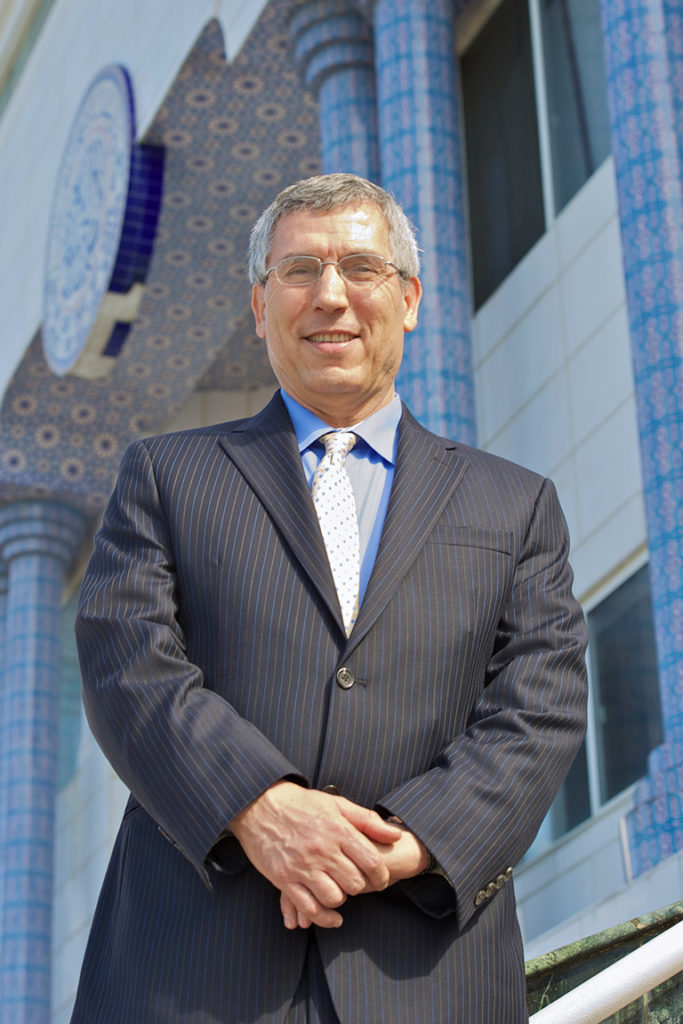 Hamoud Salhi, associate dean in the College of Natural and Behavioral Sciences at California State University, Dominguez Hills (CSUDH), joined Algerian leaders for a panel discussion on Sept. 29 during a conference celebrating the 10th anniversary of the adoption of the national reconciliation charter.
Hamoud Salhi, associate dean in the College of Natural and Behavioral Sciences at California State University, Dominguez Hills (CSUDH), joined Algerian leaders for a panel discussion on Sept. 29 during a conference celebrating the 10th anniversary of the adoption of the national reconciliation charter.
Salhi’s talk focused on how Algeria’s national reconciliation is viewed in regional and global politics. The charter, known as the “Charter for Peace and National Reconciliation,” was promulgated into law soon after it was adopted by an overwhelming majority of the population in a national referendum, held on September 29, 2005. The charter was drafted by Algerian President Abdelaziz Bouteflika to help set a path for peace after a decade of a civil war that left more than 200,000 people dead.
Salhi’s panel, the second of the day, included Mohamed Kamel Rezag Bara, senior adviser to President Bouteflika; Minister of Culture Azzeddine Mihoubi; and Salhi.
“My contribution to the panel was to discuss how the Algerian model of national reconciliation was received in countries facing conflicts and civil wars today,” Salhi said.
The one-day conference featured two panels comprised of representatives from the People’s National Assembly (the lower chamber of the parliament) and the national government. Algeria’s parliamentarian leaders, government ministers and advisers, foreign dignitaries, and the national and international press were among the attendees.
Salhi also highlighted the role that Algeria continues to play in Mali and its success in orchestrating a peace agreement that Malian fighting factions have come to support.
“Algeria has had a long tradition of supporting peaceful movements,” said Salhi, who added it was a “tradition that began during Algeria’s revolution (1954-1962),” when the country fought for its independence from colonial France, and continued throughout the 1970s in the international arena when it advocated for a new international economic order.
Algerian diplomats have held key positions in the United Nations as peace envoys, including to Syria, Sudan, and Libya, according to Salhi, who also noted that Algerian diplomats mediated the release of the 52 American hostages held in Iran in 1979.
The 10th anniversary celebration’s first panel was led by leaders of a coalition of the parties that currently form the Algerian government. The leaders of the National Liberation Front and National Rally for Democracy highlighted the significance of national reconciliation in Algeria’s history, and emphasized the role played by President Bouteflika in leading the country to peace and security over the last decade. Mohamed Larbi Ould Khelifa, president of the People’s National Assembly, reiterated a similar theme and urged the parliament to adopt Sept. 29 as Algeria’s “Day of National Reconciliation.”
Salhi’s speech was picked up by several television networks, radio stations, and news outlets in the region after it was released by Algerie Press Service. Reflecting on his trip, he felt “humbled and honored” to have been asked to participate in the conference.
Salhi is the only member of his family in the U.S. He started his career at CSUDH as a part-time lecturer in the early 1990s. He then moved to the United Arab Emirates to work as a political analyst and columnist for Gulf News, a leading English-language newspaper in the Gulf region. He returned to CSUDH in 2000, and became a full-time faculty member in 2005.
“I am very fortunate to have worked for one of the best newspaper editors in the Middle East and Northern Africa, and for an owner who understood the business of journalism to the degree that he let us do our job the best we knew how,” Salhi said. “However, as much as I loved the media and the news analysis, I still missed the classroom. In my third year in the Gulf, I realized my passion was for teaching. I returned to Dominguez Hills excited to teach again.”
Salhi remains involved in Algeria because his family is still there, and due to his strong interest in the politics of the Middle East and Northern Africa. He still appears regularly on Algerian national television and radio, and was selected by Algerian National Television as one of the top 10 most successful Algerians in the U.S. for his academic achievements.
“It is a nice position to be in, and I am so fortunate,” he said.